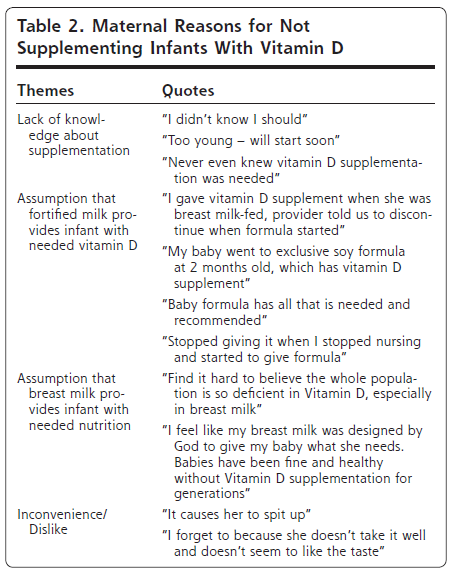Breastfed infants are at risk of vitamin D deficiency because of the low concentration of vitamin D in breast milk.
The American Academy of Pediatrics (AAP) recommends supplementation of breastfed, partially breastfed, and bottle-fed infants with vitamin D at 400 IU/d, beginning in the first few days of life. In Australia, preconception care testing or testing of pregnant women for vitamin D status is rarely done. There is no recommendation to supplement breast feeding women or infants with vitamin D. Australian women should take note of these US guidelines because breast milk typically doesn’t contain enough vitamin D to help infants develop healthy bones.
Despite having recommendations in place for breast feeding women in the US to supplement with additional vitamin D or give children oral vitamin D, adherence to these guidelines is low. A recent study looked at maternal practices and preferences for vitamin D supplementation of infants to try to understand why adherence to supplementing with vitamin D was so low. Less than half the infants in this study met the AAP recommendation for vitamin D supplementation of breastfed and bottle-fed infants.
Regarding reasons for not supplementing infants with vitamin D (Table 2), many mothers indicated lack of knowledge about supplementation, some believed that breast milk provided infants with adequate vitamin D, and others chose not to supplement because of inconvenience or their infant’s apparent dislike of the supplement.

“Many mothers were not aware of the need for vitamin D supplementation, or their physician had not recommended supplementation,” said senior study author Dr Tom Thacher, a researcher at the Mayo Clinic in Rochester, Minnesota. The findings highlight the need to educate new mothers about vitamin D and make sure breastfeeding mothers take supplements themselves or give babies additional vitamin D drops.
There is an inherent belief that breast milk is the perfect food for their baby. Infants can only receive adequate vitamin D if their mothers receive adequate vitamin D and thus there is adequate vitamin D in their breast milk. Some infant formulas may contain enough vitamin D to make supplementation unnecessary. However, babies who consume both breast milk and formula may not get enough vitamin D and still need additional vitamin D or mothers need to take supplements.
The best advice for mothers or expectant mothers, is not to assume that vitamin D levels are adequate, go to the doctor and get your vitamin D levels tested. Look at your results yourself (doctors often tell patients that borderline low results are adequate), if they are less than 100 nmol/L, you need more sun exposure and a good quality vitamin D supplement.



